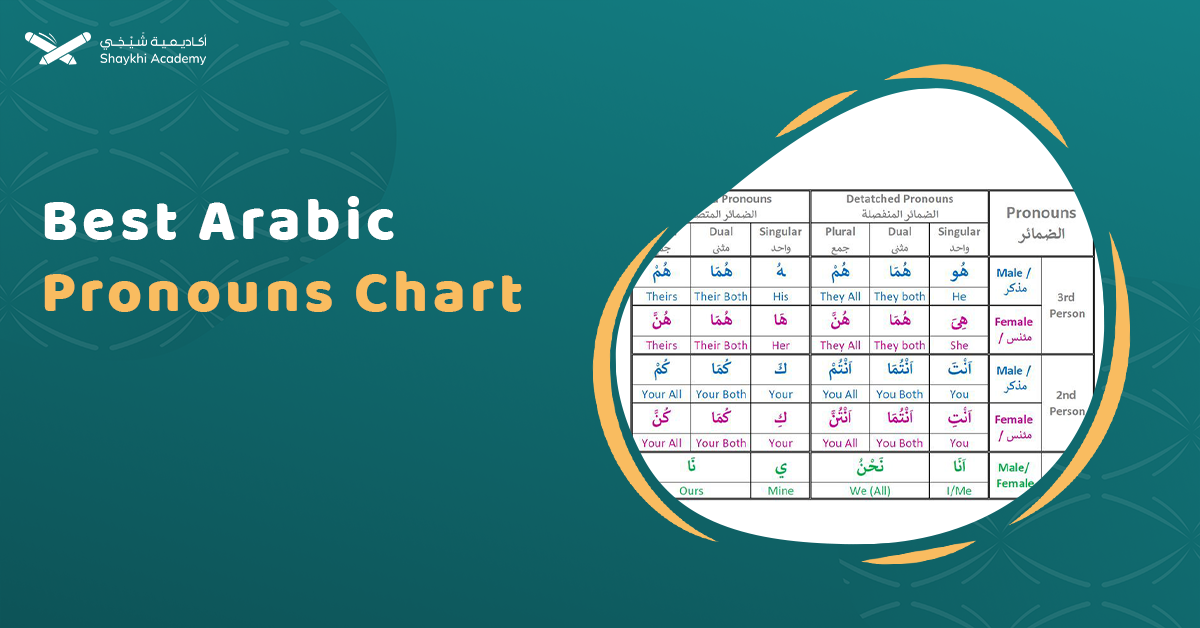Here is an Arabic Pronouns Chart organized by pronoun types:
The Arabic language has a rich system of pronouns that are essential for constructing meaningful sentences and conveying clear messages. Pronouns in Arabic are categorized into different types based on their function, form, and usage.
This chart provides a comprehensive guide to the various types of Arabic pronouns, including personal pronouns (both singular, dual, and plural), possessive pronouns, and causative pronouns.
Each pronoun is listed alongside its transliteration, translation, and an example sentence to help learners understand its application in context.
By exploring this chart, you will gain a better understanding of how pronouns are used in Arabic to express subjects, objects, possessions, and emphasis in both spoken and written forms.
Whether you’re a beginner or an advanced student, this chart will serve as a valuable reference for mastering Arabic pronouns.

1. Personal Pronouns Chart
| Pronoun (الضمير) | Transliteration | Meaning | Gender | Example Sentence |
| أنا | Ana | I | Singular | أنا أدرس (I study) |
| نحن | Nahnu | We | Plural | نحن نحب (We love) |
| أنتَ | Anta | You (masc.) | Singular | أنتَ ذكي (You are smart) |
| أنتِ | Anti | You (fem.) | Singular | أنتِ جميلة (You are beautiful) |
| أنتما | Antuma | You (dual) | Dual | أنتما تدرسان (You both study) |
| أنتم | Antum | You (masc. pl.) | Plural | أنتم تلعبون (You play) |
| أنتنّ | Antunna | You (fem. pl.) | Plural | أنتنّ تكتبن (You write) |
| هو | Huwa | He | Masculine | هو يلعب (He plays) |
| هي | Hiya | She | Feminine | هي تجلس (She sits) |
| هما | Huma | They (dual) | Dual | هما يدرسان (They study) |
| هم | Hum | They (masc.) | Plural | هم يعملون (They work) |
| هنّ | Hunna | They (fem.) | Plural | هنّ يغنين (They sing) |
2. Possessive Pronouns (Attached) Chart
| Pronoun (الضمير) | Transliteration | Meaning | Example Sentence |
| ي | -i | My | قلمي (My pen) |
| نا | -na | Our | قلمنا (Our pen) |
| كَ | -ka | Your (masc.) | قلمكَ (Your pen, masc.) |
| كِ | -ki | Your (fem.) | قلمكِ (Your pen, fem.) |
| كما | -kuma | Your (dual) | قلمكما (Your pen, dual) |
| هُ | -hu | His | قلمه (His pen) |
| ها | -ha | Her | قلمها (Her pen) |
| كم | -kum | Your (masc. pl.) | قلمكم (Your pen, masc. pl.) |
| كنّ | -kunna | Your (fem. pl.) | قلمكن (Your pen, fem. pl.) |
| هم | -hum | Their (masc.) | قلمهم (Their pen, masc.) |
| هنّ | -hunna | Their (fem.) | قلمهن (Their pen, fem.) |
3. Causative Pronouns (Detached) Chart
| Pronoun (الضمير) | Transliteration | Meaning | Example Sentence |
| إياي | ʾIyāya | Me | إياي أن تسيء (Don’t offend me) |
| إيانا | ʾIyānā | Us | إيانا مخلصون (We are sincere) |
| إياكَ | ʾIyāka | You (masc.) | إياكَ أن تغضب (Don’t anger you) |
| إياكِ | ʾIyāki | You (fem.) | إياكِ أن تذهب (Don’t go, fem.) |
| إياكما | ʾIyākumā | You (dual) | إياكما أن تذهبوا (Don’t go, both) |
| إياهم | ʾIyāhum | Them (masc.) | إياهم أن يشاركوا (Them, don’t participate) |
| إياهن | ʾIyāhunna | Them (fem.) | إياهن أن يحضرن (Don’t let them come, fem.) |
4. Relative Pronouns Chart
| Pronoun (الضمير) | Transliteration | Meaning | Example Sentence |
| الذي | al-lazī | Who (masc. singular) | الرجل الذي جاء (The man who came) |
| التي | al-latī | Who (fem. singular) | المرأة التي تكتب (The woman who writes) |
| اللذان | al-lazān | Who (dual masculine) | الرجلان اللذان ذهبا (The two men who went) |
| اللتان | al-latān | Who (dual feminine) | المرأتان اللتان ذهبتا (The two women who went) |
| الذين | al-lazīn | Who (masc. plural) | الرجال الذين ذهبوا (The men who went) |
| اللاتي | al-lātī | Who (fem. plural) | النساء اللاتي ذهبن (The women who went) |
5. Demonstrative Pronouns Chart
| Pronoun (الضمير) | Transliteration | Meaning | Example Sentence |
| هذا | hādhā | This (masc. singular, near) | هذا الكتاب (This book) |
| هذه | hādhihi | This (fem. singular, near) | هذه الطاولة (This table) |
| هذان | hādhān | These (dual, masc.) | هذان الطالبان (These two students) |
| هاتان | hātān | These (dual, fem.) | هاتان المعلمتان (These two teachers) |
| هؤلاء | hāʾulāʾi | These (plural) | هؤلاء الطلاب (These students) |
| ذلك | dhālika | That (masc. singular, far) | ذلك الجبل (That mountain) |
| تلك | tilka | That (fem. singular, far) | تلك المدينة (That city) |
| ذانك | dhānikā | Those (dual, masc.) | ذانك الرجلان (Those two men) |
| تانك | tānikā | Those (dual, fem.) | تانك المدرستان (Those two teachers) |
| أولئك | ulāʾika | Those (plural) | أولئك العلماء (Those scholars) |
6. Interrogative Pronouns Chart
| Pronoun (الضمير) | Transliteration | Meaning | Example Sentence |
| من | man | Who | من هو؟ (Who is he?) |
| ماذا | mādhā | What | ماذا تفعل؟ (What are you doing?) |
| كيف | kayfa | How | كيف حالك؟ (How are you?) |
| متى | matā | When | متى نذهب؟ (When do we go?) |
| لماذا | limādhā | Why | لماذا تأخرت؟ (Why were you late?) |
Learn Arabic Grammar with Shaykhi Academy:
Join our Arabic Grammar course to learn all the rules. You do not have to learn this new language alone. Even if your home is far from all learning centers, you can start with us from any place and at any time.
Our native teachers can guide you in mastering the language effectively. Start now with us and break the barrier of fear. We can guide you regardless of your level or your skills till you achieve proficiency.
Why Shaykhi Academy?
- Expert Native Tutors: Learn from highly qualified native Arabic speakers.
- Flexible Scheduling: Tailor your classes to fit your busy life.
- Affordable Learning: Access top-quality education at a price that suits you.
- Global Access: Study from anywhere in the world.
Explore Our Arabic Courses:
- Noorani Qaida: Build a strong foundation in Quranic Arabic.
- Comprehensive Arabic Courses: Master the Arabic language, from beginner to advanced levels.
- Fusha Arabic Classes: Delve into Modern Standard Arabic, the key to understanding literature, media, and formal communication across the Arab world.
- Quranic Arabic Course: Enhance your connection with the Quran by learning the language in which it was revealed.
Start Your Arabic Journey Today! Whether you’re just starting or looking to deepen your knowledge, Shaykhi Academy is here to support your journey. Book your free trial now and begin your path to Arabic mastery!


















































